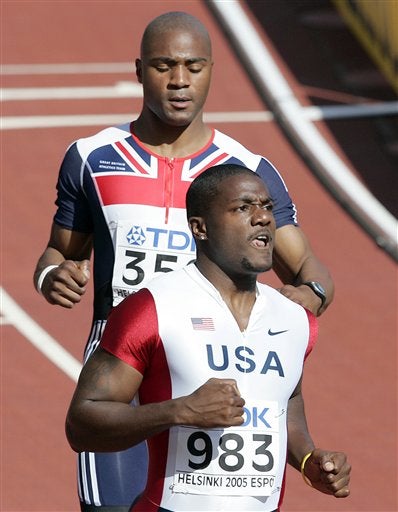Athletics: Britain on sick list with no sign of cure
Britain has won the 2012 Olympics but the World Championships are proof of the nation's decline. Mike Rowbottom reports

"It's a quiet night," he said with a sheepish grin. There have been a few here for UK Athletics.
And with the London 2012 Games now established beyond Beijing on the sporting horizon, Collins, who took up his post as UK Athletics Performance Director in March, knows as well as anyone that changes are required to meet the national expectations of what is the prime Olympic event.
On the wall behind him as he spoke were the names of champions from the European Championships held here in 1994, including Sally Gunnell, Steve Backley and Colin Jackson, who are among a plethora of former athletes now in town for the BBC. On a night when only two Britons were taking part, the presence of such luminaries served as a painful reminder of how far the domestic sport has fallen.
In fairness, Britain has never won more than three gold medals at a World Championships, and since 1993 only only three golds have been collected in total - with Jackson supplying one in 1999 and Jonathan Edwards contributing the others in 1995 and 2001.
And if Paula Radcliffe claims the marathon title her talent deserves, and one or other of the 400m relay teams rises to the occasion, the domestic sport might yet find itself with a tally of medals that does not look drastically out of keeping with some previous performances. But that will not alter the underlying weaknesses which the past week has revealed within British athletics. Lacking champions is one thing; lacking contenders is another.
Including last night's programme, of 31 finals, including heptathlon and the women's 10,000m for which no qualifying round was required, Britain contested just five, with no more than one athlete in each case. Save for Kelly Sotherton's eighth place in the long jump final, which followed her disappointing failure to earn a medal in the heptathlon, Britain had four consecutive days in which there was nobody to be seen in a quest for medals.
As an indicator of underlying health, the points system - whereby first place earns eight points, and eighth place one - is instructive. At the inaugural World Championships here in 1983, Britain finished with 104 points. At Stuttgart in 1993 the total was 95, since when it has declined steadily. Two years ago in Paris, the total was 45. Before Benjamin's final last night the figure stood at five, all of which have been contributed by Sotherton.
Even the most pessimistic forecaster would not suggest that that total will not have risen by the close of the Championships, but it is almost impossible to see it reaching beyond 30.
Earlier this week, the man who played such a crucial role in gaining London the Olympics, Seb Coe, observed that these World Championships would have to be a "turning point" for British athletics.
That is not something with which Collins would disagree. In his foreword in the British team handbook he spoke of a "transition period" for the domestic sport, adding: "These Championships offer an opportunity and a threat; an opportunity for the potential stars and a possible banana skin for the experienced."
While the honourable performances of such as the European Under-23 champions, Rhys Williams and Robert Tobin, have offered hope for future success, these have turned into the Banana-Skin Championships for Britain.
But while British athletics may be lying in the gutter, Collins - a former Professor of Sports Psychology at Edinburgh University - is looking at the stars. "If we had five or six medals, or if we had no medals, there would be no change in the complexion of what we've got to do," he said. "The thing here is not what we come away with so much as the manner in which athletes perform.
"For me this season has always been about waiting, learning, planning - and a bloody hard winter of work. Within a couple of months, there are going to be changes to the training conditions of a number of athletes. And we have brought some people here whom I don't think we will be taking to the Championships in future."
Next season, contracts between athletes and their federation will be introduced which will use the leverage of Lottery funding to demand certain standards of performance.
Collins, and the sport, also stand to benefit from a renewed surge in Lottery funding given the fact that London has secured the 2012 Games, but he insists that will not simply mean extending a programme that currently supports around 40 élite athletes.
Extra cash is most likely to go towards coaching support, and much of it may be put towards his idea of bringing in talented coaches from around the world for three-week working sessions with home athletes and coaches.
It sounds good in practice. But which British sprints coach would actually welcome a brief visit from, say, John Smith, the man who works with the former world record-holder Maurice Greene in the States? Collins expects his athletes, and coaches, to behave at all times like intelligent adults. That could be a problem.
Join our commenting forum
Join thought-provoking conversations, follow other Independent readers and see their replies
Comments
Bookmark popover
Removed from bookmarks